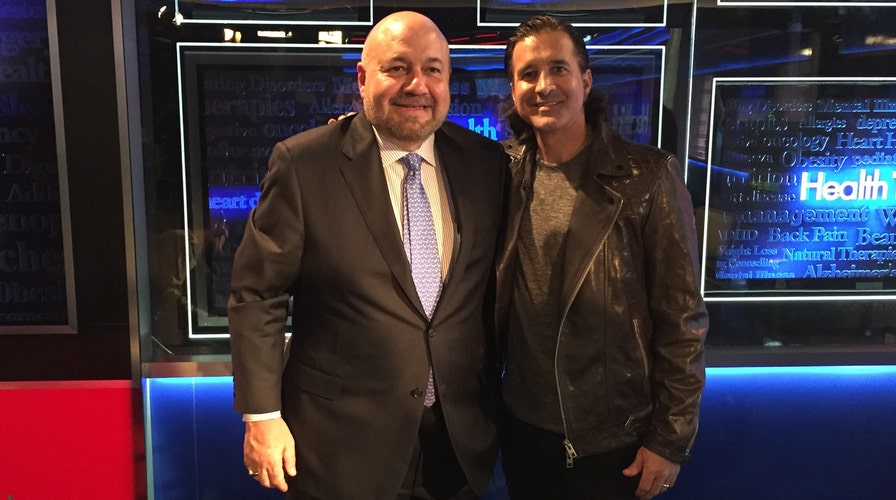Creed’s Scott Stapp on living with bipolar disorder
Scott Stapp’s dreams of solo success came to a halt when a very public drug and bipolar- induced breakdown sent him on a downward spiral. Dr. Manny sits down with Creed frontman to talk about his road to recovery
In the late ‘90s and early 2000s, hard rock band Creed was at the top of its game, selling over 40 million albums worldwide and winning a Grammy in 2001 for best rock song, “With Arms Wide Open.” But by 2014, lead singer Scott Stapp was far from the top of his game when a very public drug and bipolar-induced breakdown sent him on a downward spiral.
In December 2014, Stapp released a video claiming he was homeless and “under some kind of vicious attack.” His delusions went so far that he told his wife he was a secret CIA agent on a mission to kill President Obama.
In May 2015 Stapp and his wife, Jaclyn, came clean about what was behind his psychotic meltdown: bipolar disorder. Stapp’s mental illness had gone undiagnosed for over a decade. His doctors originally diagnosed him with depression in 1998.
“I was treated with depression without knowing that at the time I had bipolar starting to manifest,” Stapp, 42, told FoxNews.com. “Looking back, had I been properly diagnosed in ’98, I venture to say my whole life would be vastly different.”
According to a National Depressive and Manic Depressive Association (DMDA) survey conducted in 2000, 69 percent of respondents with bipolar disorder were misdiagnosed. The National Institute of Mental Health describes bipolar as a brain disorder that causes unusual shifts in mood, energy and activity levels.
There is no single cause for bipolar disorder, but some research suggests factors like brain structure, genetics and family history may play a role.
“Mental health issues run on both sides of my family,” Stapp said. “We’re pretty certain I was innately predisposed to it and that it was going to take a hold through my DNA whenever that time was coming.”
Mental health problems are commonly associated with substance abuse. Approximately 60 percent of patients with bipolar I disorder have a lifetime diagnosis of a substance abuse disorder. In the midst of living the rock and roll lifestyle, Stapp started to depend on alcohol and marijuana to compensate his extreme moods.
“Alcohol and marijuana gave me temporary relief,” Stapp said. “The marijuana took me out of depression at times and alcohol took me out of my mania. After a long period of time of using those things to get balanced, that’s when addiction manifested. It took a number of years before it went from a self-medicating tool to full-blown alcoholism.”
Like with any mental health disorder, there is no quick fix or cure. However, medicine is available to help control the mood swings and symptoms. Some experts suggest a combination of treatments that usually include medication, psychotherapy and lifestyle changes.
“We can treat this with lifestyle changes, health and diet changes and medication and you can be returned to normal, so to speak,” Stapp said.
Stapp also attributes his recovery to getting an ample amount of sleep, meditating and going through a 12-step program for substance abuse. But the love of his family was the biggest influence in his rehabilitation, he said.
“The number one factor I believe that saved me and really turned the corner with me was the love of my family and the support of my family because had I not had that from my wife and my family I don’t think I could have gotten to the other side,” Stapp said. “I think sometimes the families get left out of the equation but when you have a loved one who’s suffering, the family is critical to them getting well and it definitely was for me.”
Today, Stapp looks at his bipolar diagnosis as a blessing in disguise.
"Bipolar in some regards has been a blessing because it’s been a catalyst to make the changes in my life that I needed to make"
“Bipolar in some regards has been a blessing because it’s been a catalyst to make the changes in my life that I needed to make,” he said. “That manic episode shattered me, it was immense embarrassment, humiliation – but had that not happed I wouldn’t be where I am today, rebuilding my life, my career, a more stable me that I haven’t been in 20 years.”
Stapp is in the middle of his 2016 Proof of Life solo tour and has plans to add more cities and dates before returning to the studio to record a new album early next year.
While on tour, fans have continued to support and inspire Stapp.
“The compassion and the outpouring of love with people saying, ‘Hey man we’ve been there too,’ has really helped in kind of rebuilding my sense of self, and so I owe the fans the world for that,” he said.
With regards to a much anticipated Creed reunion, Stapp said he hopes to reunite with his old band.
“Creed is one of the greatest musical experiences I’ve ever had in my life,” Stapp said. “When the time is right and everyone’s other musical excursions have resolved and it fits into what we’re doing, I would think that it would be cool to get back together, but we’re going to have to wait and see what happens.”
For more visit ScottStapp.com.

